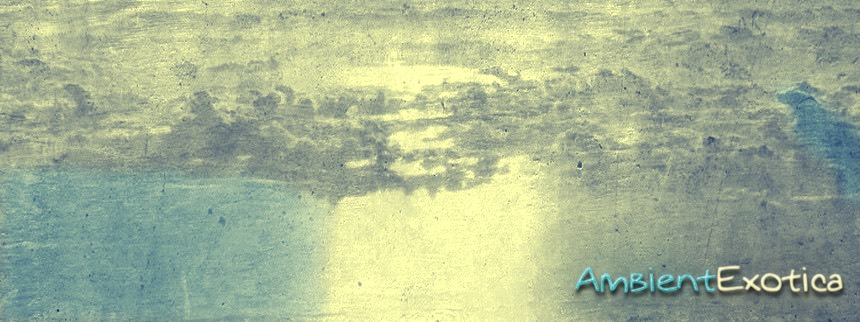
Zenjungle
All Of Our Yesterdays
2015
Athens, Greece-based multi-instrumentalist Phil Gardelis aka Zenjungle is fond of a holistic viewpoint. He never explicitly stated this, but tendency shows that his compositions and arrangements assimilate, incorporate and withstand both the salubrious and spectral entities they are encapsulating, leading to a grave architecture of uncertainty, prosopagnosia… and vitalism. Enter All Of Our Yesterdays, a rubicund longform piece of 22+ minutes released on Michael Waring’s Future Sequence label and magazine. The digital-only track is available at Bandcamp and the first in a series of similarly long entities; one can only guess and ponder how forthcoming artists are going to establish their thought processes in this medium of magnanimous time-related longevity. Zenjungle’s music meanwhile is fond of atomism, outlining and expounding the diaphanous ingredients and various hatched solanums.
With All Of Our Yesterdays, the textural focus surprisingly shifts away from Gardelis’ tenor saxophone, usually his signature instrument whose ubiquity carries a track. Here the presence of the instrument is toned down, veneered and caulked, only occasionally aided by Nektarios Manaras on the flügelhorn. The reason of the instrument’s omission – or its heavily processed and hence unrecognizable state most of the time – is the granular, particle-driven legitimacy within the music itself. The given track title freely gives away the focus on commemorative patterns, insular incidents, recondite undercurrents. Does this composition still maintain the aura of an estival journey as previously inherited by Zenjungle’s excellent Leaving Stations (Twice Removed Records, 2014)? No, it doesn’t. And I’m not even sure of journey being the rightful term in the wake of the track’s perapsis to our own lifes… and yesterdays.
Even though Gardelis has all the time in the world regarding the establishment of the textures and field of vision, All Of Our Yesterdays is certain about its transmuting existence and showcases its in medias res morpheogenesis right from the get-go. The viridian chromophore levels of the gelid fermions in tandem with the medulla-emptying low frequency smashes evoke a forgone incident that is both haphazard and hazardous. Comparatively languorous guitar chords function as counterparts, emitting ultramafic warmth and polarimetric incandescence. Their softened punctilio is the pulsatile aorta, the nutritious serpentine to guide the traveling subject through the rumbling afterglow of each forceful earthquake-resembling eruption. Added to this clandestine cloak-and-dagger photodissociation is the semi-industrial metallicity Zenjungle’s work is (also) known for: whether it is caustic guitar shards, steel-alloyed stokehold sinews, heating system circulating pumps amidst train-like screeches or the extrapolation of protrusive drones entrapped in heavy current, All Of Our Yesterdays aurally prepares for an unknown angular momentum, a telomere-fueled chromaticity.
It is approximately seven minutes into the piece that Gardelis’ signature instrument is first heard, adding to the sensorial apprehension of the portentous gravitational redshift: the tenor saxophone. While Zenjungle’s productions usually place this device in the epicenter where its yearning neo-noir surfactants rotoscope through cavernous spheres, here in All Of Our Yesterdays the grave presence is toned-down in favor of sarcopenia. Smoke, steam and apoplectic cloudlets are the primary forces instead. Pressure chamber plateaus, rhombohedral wind gusts and fearful fibroblasts are altogether equipollent parts of the complete baseframe. There are flittering jitters in this erudite ergosphere aplenty, but the vast majority of the accidental melodies is processed, prolonged, elasticized. However, since the cryovolcanic outbursts happen in the distance, in an inferior parallax layer adjacent to the alkaline foveae and plethoric tumults, the threshold to the sheer puissance of Shoegaze is never really crossed, only faintly hinted at.
The omission of a metamorphosis into the Shoegaze or Power Drone subgenre is presumably caused by the lacunar ventricle-centric arrangement Gardelis is maintaining throughout the runtime of 22+ minutes. Before All Of Our Yesterdays winds down with the calcined afterglow of guitar gridlocks which themselves lead to a palpable palinopsia, the balance between sound, sustain and silence becomes apparent in the senescent stage or last quarter of the piece. All raucous riots cease to exist, leading to an absurdly spongy yet monoclinic plasticity. The titration process slightly changes, literally making room for the plasmatic reverberation to vaporize and discarnate into the widening nullspace. The periglacial emptiness that sets in doesn’t materialize all of a sudden, and it isn’t even threatening or apocalyptic per se. The opposite is the case: a prismatic purity spreads out and unfurls lachrymose leptons, pristine planetesimals. The airflow is cleansed and purged, all vesicular ventiducts ostracized, a foreshadowing perturbation unlikely to accrete once the final chords lead to the void and into the very extrinsic surface All Of Our Yesterdays is about, but cannot ever physically cross.
If it wasn’t so well-worn and trivialized, I would adhere the emphasis of the term journey to All Of Our Yesterdays, but what would be the big deal about the overused word both in terms of Zenjungle’s compositions in particular and other artists’ output in general? Maybe there is a different description that delineates the shapeshifting appeal a tad more efficiently. Zenjungle’s journey on this piece much more resembles a microbial phoresy: one organism scours the other without being a parasite or health-destroying antimatter. This is, however, more of a sentiment than a clear-cut definition chiseled in stone; the tendency of an infinitesimal abiogenesis plus the ensuing circumambulation taking place within the track’s boundaries – due to its sheer duration alone – lead to a comparatively chaotic cosmos from a human(e) point of view, thereby causing the listener to try and grasp the barycenter. But there is none. All Of Our Yesterdays embraces the plural and is thus based on diffeomorphism, on polysemous polymers, zoetropic attractions and happenstances hued in helicoidal haze. Different memories are agglutinated, and while the state of the noosphere is never reached, the established aura only seems to be indifferent and arbitrary. In fact, though, this varied fugacity serves the inherent epistemology that reigns within the track’s epithelia. All memories are absorbed and processed. But as is the pressing question in real life: can memorial superimpositions be precisely documented and therefore universally understood at all?
Further listening and reading:
- You can purchase and listen to All Of Our Yesterdays at Bandcamp.
- Zenjungle and Future Sequence are on Twitter: @zenjungle & @futuresequence.
Ambient Review 429: Zenjungle – All Of Our Yesterdays (2015). Originally published on Apr. 22, 2015 at AmbientExotica.com.
